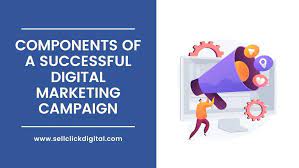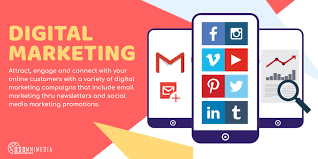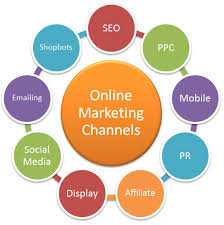The Power of Successful Digital Marketing Campaigns
Digital marketing has revolutionised the way businesses promote their products and services. In today’s digital age, a successful marketing campaign can make all the difference in reaching and engaging with your target audience effectively. Let’s explore what sets apart successful digital marketing campaigns and how they drive business growth.
Creative and Engaging Content
One key element of a successful digital marketing campaign is the creation of creative and engaging content. Whether it’s compelling visuals, informative videos, or captivating copywriting, content that resonates with your audience can help increase brand awareness and drive customer engagement.
Targeted Audience Segmentation
Understanding your target audience is crucial for the success of any digital marketing campaign. By segmenting your audience based on demographics, interests, or online behaviour, you can tailor your messaging to specific groups, increasing the relevance of your content and improving conversion rates.
Data-Driven Strategies
Successful digital marketing campaigns rely on data-driven strategies to measure performance and make informed decisions. By analysing key metrics such as website traffic, click-through rates, and conversion rates, marketers can optimise their campaigns for better results and ROI.
Multichannel Approach
Diversifying your digital marketing efforts across multiple channels can help reach a wider audience and maximise your campaign’s impact. From social media platforms to email marketing and search engine optimisation (SEO), a multichannel approach allows you to engage with customers at various touchpoints along their buying journey.
Consistent Brand Messaging
Consistency is key when it comes to brand messaging in digital marketing campaigns. Maintaining a cohesive brand identity across all channels helps build trust with your audience and reinforces brand recognition. Whether it’s through social media posts, email newsletters, or paid advertising, a consistent message strengthens your brand presence in the minds of consumers.
Conclusion
Successful digital marketing campaigns are not just about reaching a large audience but about engaging with them in meaningful ways that drive results. By focusing on creative content creation, targeted audience segmentation, data-driven strategies, a multichannel approach, and consistent brand messaging, businesses can achieve their marketing goals and stand out in today’s competitive digital landscape.
Top 5 Advantages of Successful Digital Marketing Campaigns
- Increased brand visibility and awareness among target audience
- Ability to reach a global audience at a fraction of traditional marketing costs
- Measurable results through data analytics for informed decision-making
- Enhanced customer engagement and interaction for building lasting relationships
- Opportunity for real-time adjustments to optimise campaign performance
Challenges in Successful Digital Marketing Campaigns: Navigating Competition, Trends, and Customer Engagement
- High competition can make it challenging to stand out among other successful campaigns.
- Digital marketing trends evolve rapidly, requiring constant adaptation to stay relevant.
- Managing multiple digital channels simultaneously can be overwhelming and resource-intensive.
- Measuring the true impact and ROI of a digital marketing campaign can be complex and time-consuming.
- Negative feedback or backlash on social media platforms can quickly damage brand reputation.
- Relying too heavily on automated tools and algorithms may lead to a loss of personal touch in customer interactions.
Increased brand visibility and awareness among target audience
A significant benefit of successful digital marketing campaigns is the heightened brand visibility and awareness they bring among the intended target audience. By strategically promoting a brand across various online channels, businesses can ensure that their message reaches the right people at the right time, increasing recognition and familiarity with the brand. This enhanced visibility not only attracts potential customers but also reinforces the brand’s presence in the minds of existing customers, ultimately leading to improved customer loyalty and trust.
Ability to reach a global audience at a fraction of traditional marketing costs
One significant advantage of successful digital marketing campaigns is the ability to reach a global audience at a fraction of traditional marketing costs. By leveraging online platforms and tools, businesses can extend their reach beyond geographical boundaries and connect with customers worldwide without the hefty expenses associated with traditional marketing channels. This cost-effective approach not only allows for targeted outreach but also enables businesses to maximise their marketing budget and achieve greater ROI on their campaigns.
Measurable results through data analytics for informed decision-making
One significant advantage of successful digital marketing campaigns is the ability to achieve measurable results through data analytics, enabling businesses to make informed decisions. By analysing key metrics such as website traffic, conversion rates, and customer engagement, marketers can gain valuable insights into the effectiveness of their campaigns. This data-driven approach empowers businesses to identify what works well and what needs improvement, allowing for strategic adjustments to maximise ROI and overall campaign performance.
Enhanced customer engagement and interaction for building lasting relationships
Enhanced customer engagement and interaction are key benefits of successful digital marketing campaigns. By creating meaningful interactions with customers through personalised content, targeted messaging, and interactive experiences, businesses can build lasting relationships that foster loyalty and trust. Through consistent engagement across various digital channels, companies can connect with their audience on a deeper level, understand their needs and preferences better, and ultimately create a community of loyal customers who advocate for their brand. This focus on building relationships leads to increased customer retention, higher customer lifetime value, and ultimately contributes to long-term business success.
Opportunity for real-time adjustments to optimise campaign performance
One significant advantage of successful digital marketing campaigns is the opportunity for real-time adjustments to optimise campaign performance. Unlike traditional marketing methods, digital campaigns allow marketers to monitor and analyse data in real time, enabling them to make quick adjustments based on performance metrics. This flexibility empowers businesses to tweak their strategies on the go, ensuring that resources are allocated efficiently and that the campaign is continually optimised for maximum impact and results.
High competition can make it challenging to stand out among other successful campaigns.
In the realm of successful digital marketing campaigns, one significant challenge that businesses face is the high level of competition. With numerous brands vying for the attention of online audiences, standing out amidst a sea of successful campaigns can be a daunting task. The saturation of the digital landscape means that businesses must continuously innovate and refine their strategies to capture and maintain consumer interest in an increasingly crowded marketplace. Adapting to this competitive environment requires creativity, strategic thinking, and a deep understanding of consumer behaviour to carve out a distinct identity and make a lasting impact in the digital sphere.
Digital marketing trends evolve rapidly, requiring constant adaptation to stay relevant.
In the realm of successful digital marketing campaigns, a notable challenge lies in the rapid evolution of digital marketing trends, demanding continuous adaptation to remain relevant. The dynamic nature of the digital landscape means that strategies and techniques that worked yesterday may not yield the same results tomorrow. Marketers must stay vigilant, keep pace with emerging trends, and be ready to adjust their approaches swiftly to effectively engage with their target audience in an ever-changing online environment.
Managing multiple digital channels simultaneously can be overwhelming and resource-intensive.
Managing multiple digital channels simultaneously can present a significant challenge for businesses embarking on successful digital marketing campaigns. The need to maintain a consistent brand presence across various platforms such as social media, email marketing, and search engines can be overwhelming and resource-intensive. From creating tailored content for each channel to monitoring performance metrics and engaging with audiences effectively, the demand for time, expertise, and resources can strain even the most well-equipped marketing teams. Finding a balance between maximising reach and ensuring quality in each channel becomes crucial to navigating this con of digital marketing successfully.
Measuring the true impact and ROI of a digital marketing campaign can be complex and time-consuming.
Measuring the true impact and return on investment (ROI) of a digital marketing campaign can present a significant challenge for businesses. The complexity and time-consuming nature of accurately assessing the effectiveness of various digital marketing strategies often require in-depth analysis of multiple data points and metrics. From tracking website traffic to monitoring conversion rates and analysing customer engagement, the process of determining the tangible outcomes of a campaign demands careful attention to detail and a thorough understanding of key performance indicators. Despite these obstacles, investing time and resources into comprehensive measurement techniques is essential for businesses aiming to optimise their digital marketing efforts and achieve long-term success in an increasingly competitive online landscape.
Negative feedback or backlash on social media platforms can quickly damage brand reputation.
In the realm of successful digital marketing campaigns, one significant drawback to be wary of is the potential for negative feedback or backlash on social media platforms. In today’s interconnected world, where opinions can spread rapidly and reach a vast audience within seconds, a single misstep or customer dissatisfaction can escalate into a full-blown reputation crisis for a brand. It is essential for businesses to actively monitor and address any negative feedback promptly to mitigate the impact on their brand image and maintain trust with their audience.
Relying too heavily on automated tools and algorithms may lead to a loss of personal touch in customer interactions.
In the realm of successful digital marketing campaigns, a notable con lies in the potential downside of over-reliance on automated tools and algorithms. While these technological advancements can streamline processes and enhance efficiency, there is a risk of sacrificing the personal touch in customer interactions. When human interactions are replaced by automated responses and predetermined algorithms, the genuine connection between businesses and customers may diminish, leading to a loss of authenticity and personalised engagement. Striking a balance between automation and maintaining authentic human connections is crucial to ensure that digital marketing campaigns resonate with audiences on a more personal level.




